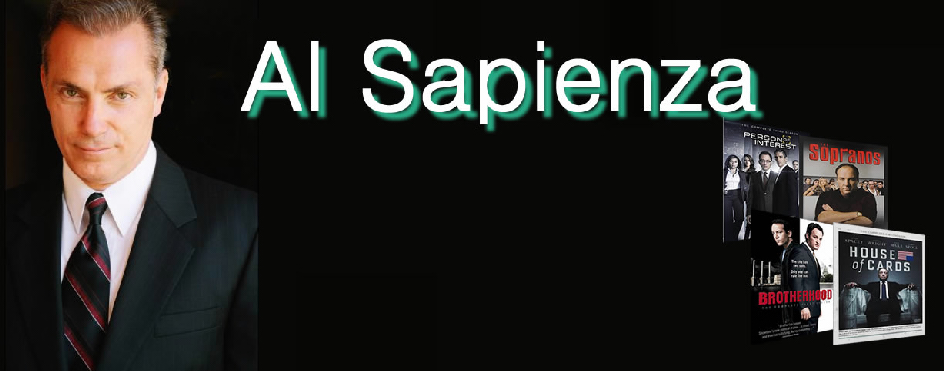 |
|||||||||||||||||||
Chances are you know Al Sapienza! July 30, 2013. Written by Paul Guzzo
I am a friend of Al Sapienza's. He has been in three independent short films I have written. I've had dinner and drinks with him on multiple occasions. My parents were invited to his wedding. While I wouldn't call him my BFF and send him text messages late at night, our relationship can be definitely be defined as a friendship. Chances are, you know Al Sapienza as well. Perhaps you have never shared drinks with him, but he has probably been in your home numerous times. If you own a television, the above statement is most likely accurate. With close to 200 TV and film credits to his name, it would be near impossible to have never seen his work, especially when his resume includes recurring roles on such famed television shows as The Sopranos , 24 , Prison Break , Person Of Interest , and House of Cards . This is the point in the article where you take a break to visit his IMDB page and say, “Oh yeah, I recognize that guy.” “That guy” is the best way to label an actor like Sapienza – A “That Guy Actor,” a phrase coined by sportswriter Bill Simmons to describe those thespians whose names are never on the tip of your tongue yet when they appear on the screen you immediately think, “Hey, it's that guy from” and then name a particular television show from which you recognize him. Many actors may be offended by such a distinction. Many get into show business for the fame of the career; they want to be household names. Sapienza, however, embraces being one of Hollywood's unknown yet known actors. For starters, to be instantly recognizable, if only physically, the moment he appears in a television show means he has not only landed more roles than most but he has performed his craft in a way in which he stands out. But Sapienza also doesn't mind being a “That Guy Actor” because he didn't get into the entertainment field for egotistical reasons, but rather because he truly has a creative itch to scratch. “I think I am pretty lucky right now,” he says. “I am in a place in the industry where I am respected by my peers but can live a normal life. People recognize me on TV, but when they see me in person at a store or a restaurant, it doesn't register with them that they know my face.” “I have never dreamt of being Brad Pitt. I never have desired to be a superstar. I have always just wanted to be a well-respected actor. I think I have accomplished that.” He did so with a blue-collar work ethic. While Sapienza, like all actors, was always hoping his big break would arrive, he didn't wait for it. From the start, Sapienza was one of the hardest working actors in the business. He discovered acting while a student at New York University. With the monetary help of his sister, he signed up for acting classes where he was continually paired with Jackie Zerman. In later years, she went on to star In ABC's General Hospital . Her claim to fame at the time, however, was being the wife of Murray Kaufman, the famed rock disc jockey who frequently referred to himself as the fifth Beatle. Sapienza has been playing the drums since he was 8 and earned extra money while in college by playing behind cabaret acts in Greenwich Village. His passion for music and his talent impressed Kaufman, who helped him land the part of Ringo in the Broadway show “Beatlemania.”
It seemed Sapienza was on the fast track to success. When the tour was over, he packed up his life and moved west to Tinseltown. One of the first actors he befriended in Hollywood was Paul Gleason, perhaps the 1980s' ultimate “That Guy Actor.” Gleason seemed to be in every movie and television series produced in that decade. His most famous roles include the principal in The Breakfast Club and the deputy police chief in Die Hard , but he has over 140 credits to his name. “He's the type of actor that all actors should look up to,” said Sapienza. “He is an immense talent and a true professional.” To this day, Sapienza credits Gleason's advice for his success. “He told me, ‘Just work on the work. Don't get involved in the nightlife or worry about getting famous. If you are good, producers will find you. There is no shortage of actors; there is a shortage of good actors,'” relates Sapienza. “And he was right. Are there some actors who show up in Hollywood, land a role in a major film and skyrocket to the top? Sure. But for most, the way to success as an actor is the same as in any field – work your ass off.” That is what Sapienza did. Over the next 17 years, he added almost 70 roles to his acting resume. These parts were not were glamorous; they were mostly a hodgepodge of background characters like the doorman in Pretty Woman , the Italian tomato salesman in Who's The Boss , a guard in Hunter or a paramedic in Married With Children . But, he was paying the bills and living comfortably solely as an actor, a feat not many can claim. More importantly, he was rubbing shoulders with Hollywood elite and earning a reputation as a dependable and talented actor who could fill a needed role. Then, in 1999, he finally received his big break – The Sopranos . Shortly after the pilot was shot, the brain behind the groundbreaking show, David Chase, began auditions for roles to fill out the rest of that season's cast. The night before Sapienza read, he watched the pilot and was blown away by its content. “It was brilliant,” exclaimed Sapienza. “I had to be a part of it. I had never wanted a role do badly.” He was cast as Mikey Palmice, Uncle Junior's wisecracking driver and henchman who perfected the art of getting under Tony Soprano's skin. “The scripts excited me,” he said. “I suspected the show had a big future. Most of the case was like me – unknowns. Even James Gandolfini had only small roles in a few films. Lorraine Bracco was the only real star. To the outsider, there was no reason to believe the show would be huge. But everyone who was part of that first season had a feeling it could be something special.” They were correct. Unfortunately for Sapienza, he would not enjoy the spoils of the show's future success. Sapienza has the dubious historical distinction of playing the character that set the show's precedent that no one was safe from death. “He calls me into his office before we were set to shoot episode seven,” recalls Sapienza. “He tells me I am doing a great job. I tell him how much I love doing the show. Then, he got kind of somber and says, ‘You know you're going to die?'”
He said he begged Chase to allow his character to live, suggesting they bring in a guest star to be killed in his stead. Chase replied that was not an option. Mikey Palmice's story arc was supposed to end with him dead. It was an announcement to the viewers that no one is safe; everybody is a potential victim if they tick off Tony Soprano. “What was funny was that David Chase was confused as to why I was so upset,” remembered Sapienza. “I told him it was because this show was going to be a major hit. He laughed. He didn't think America would understand the show's humor. And then he said, ‘If the show does get picked up for a second season, I have nothing else to say on the matter.' The first season was all about his real life relationship with his mother and he wrapped it around a mafia story. He felt he told the whole story in one season.” The show of course went another six seasons, becoming one of greatest series in the history of television. Following season 3, of The Sopranos , I was in Palm Beach with Sapienza for a film festival. My short film, The Dance , was playing that weekend and Sapienza was one of its leads. He was there to support a much larger film he was in called Back In The Day , which starred Ving Rhames, Ja Rule and Pam Grier. But Al came to see my film as well and following the screening we had drinks at the hotel bar. I was curious what it was like to be written off a show and then have it reach epic heights. He lamented that initially it bothered him. He was a major character in the first season, he said, yet only diehard fans of the show remember him. But anyone who plays a bit part on any series following season one, even if on the screen for just a few seconds, became an overnight sensation. He admitted he wouldn't be human if it didn't bother him just a little bit. “But it really did only bother me for just a little bit,” Sapeinza told me when I relayed that memory to him. “I had two choices – let that moment ruin me or remember why I got into acting in the first place. I do this because I love to create characters and tell stories. I do not act for fame. Am I still upset I was written off? Of course, but not because other actors are more known for the time they spent on the show. I'm upset because I would have loved to have been a part of more great stories. I would have loved for my character to grow.” And rather than allowing losing out on the fame of The Sopranos eat him up, he went right back to work, doing so harder than ever. Only this time, he had a significant role in a major series on his resume. Despite a short stint on the series and despite not gaining the notoriety of other actors on the show, Sapienza said it was his big break. It allowed producers to see he could carry a larger role.
Both roles have helped to further launch his already successful career. While he could not be considered an A-list actor, the type of name and face a movie studio or television network can make the backbone of a major project, he is actually one of the top 5 percent of all earners in Hollywood, proven by the fact he receives full benefits from SAG. This should mean he is far too big to be hanging out in Tampa and playing a role in a locally produced independent film. Yet, whenever I call on Sapienza and tell him I have a project I think he fits, he always says yes. Even on occasions when he is in the middle of shooting a major film or television series, he has flown to Tampa on his day off, shot his scenes and then immediately flown back to his major set. In an industry filled with egos, with actors who seem to believe their most important role is to pretend they are more relevant than they are, Sapienza is a breath of fresh air. He is actor who has never allowed his success to go to his head. That perhaps sums up who Al Sapienza is. To most of America, he is “That Guy.” To those who truly know him, he is a great guy. |
|||||||||||||||||||
Home | About | Filmography | Theater | Comedy | Gallery | Media | IMDB | Contact This is the Official web site of Al Sapienza.
|
|||||||||||||||||||

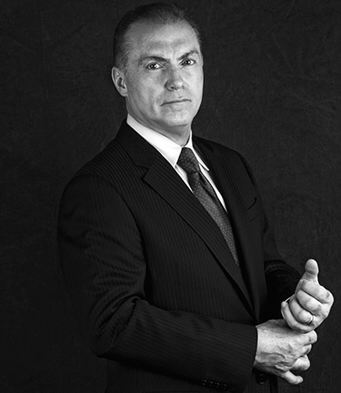
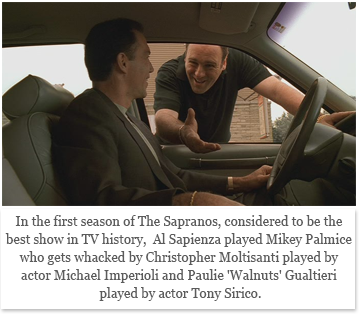 He was flipping pizzas at his brother's restaurant when he was offered the role. Over the next few years, he was touring the world.
He was flipping pizzas at his brother's restaurant when he was offered the role. Over the next few years, he was touring the world. 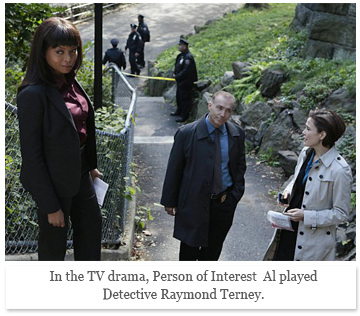 He was devastated by this revelation.
He was devastated by this revelation. 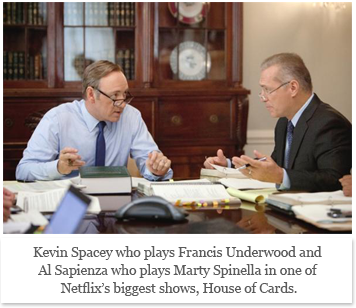 He was no longer relegated to bit background players and characters without names. Instead, his resume began compiling recurring roles on major television series – four episodes as mobster Philly Falzone on Prison Break , three episodes as private investigator Paul Koplin on 24 , and three episodes as gangster Phil Sanfino on Blue Bloods , just to name a few. In all, since Mikey Palmice was murdered while taking a jog in his new sneakers one cold New Jersey day, Sapienza has appeared in almost 130 different projects between film and television, all culminating in this past year that has by far been his most successful; he had substantial roles in two hit shows. He plays a recurring character, Detective Raymond Terney, in Person Of Interest . And he portrayed educational lobbyist Marty Spinella in the Emmy-nominated House Of Cards .
He was no longer relegated to bit background players and characters without names. Instead, his resume began compiling recurring roles on major television series – four episodes as mobster Philly Falzone on Prison Break , three episodes as private investigator Paul Koplin on 24 , and three episodes as gangster Phil Sanfino on Blue Bloods , just to name a few. In all, since Mikey Palmice was murdered while taking a jog in his new sneakers one cold New Jersey day, Sapienza has appeared in almost 130 different projects between film and television, all culminating in this past year that has by far been his most successful; he had substantial roles in two hit shows. He plays a recurring character, Detective Raymond Terney, in Person Of Interest . And he portrayed educational lobbyist Marty Spinella in the Emmy-nominated House Of Cards .